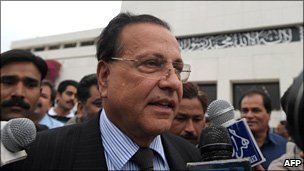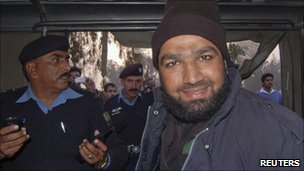The influential governor of Pakistan's Punjab province, Salman Taseer, has died after being shot by one of his bodyguards in the capital, Islamabad. Mr Taseer, a senior member of the Pakistan People's Party, was shot when getting into his car at a market.
Interior Minister Rehman Malik said the guard had told police that he killed Mr Taseer because of the governor's opposition to Pakistan's blasphemy law. Many were angered by his defence of a Christian woman sentenced to death. Prime Minister Yousuf Raza Gilani declared three days of national mourning and ordered flags lowered to half-mast. He also ordered an immediate inquiry into Mr Taseer's killing and appealed for calm. Dozens of PPP supporters have taken to streets in Punjab's capital, Lahore, burning tyres and blocking traffic, the AFP news agency reports.
It is the most high profile assassination in Pakistan since the killing of former Prime Minister Benazir Bhutto, the PPP's leader, in 2007. Mr Taseer, 66, was shot several times at close range by his Elite Force guard as he got into his car at the Kohsar Market, a shopping centre in Islamabad popular with Westerners and wealthy Pakistanis, Mr Malik said.

Salman Taseer was politically close to the president
"The governor fell down and the man who fired at him threw down his gun and raised both hands," Ali Imran, a witness, told the Reuters news agency. Unconfirmed reports say up to five other people were wounded when Mr Taseer's other bodyguards opened fire following the attack.
It is believed Mr Taseer had been returning to his car after meeting a friend for lunch at a nearby restaurant. He had previously been to the presidential palace, the Senate and the interior ministry.
At a news conference in the capital, Mr Malik said: "The police guard who killed him says he did this because Mr Taseer recently defended the proposed amendments to the blasphemy law."
The assassination of Salman Taseer once again highlights Pakistan's unending troubles. He was a high-profile leader of the PPP, and was governor of the country's largest province, Punjab. His death has left the country in shock at a time when it faces an imminent political crisis.
On the face of it, the assassination appears to be an individual act of a police guard in Mr Taseer's security detail. The guard has reportedly said he killed him because Mr Taseer publicly opposed the blasphemy law. But the timing of the assassination holds deeper implications for the government, which is struggling to shore up political support to maintain a majority in the parliament. Whether it gets this support will be decided by one of two major political forces of Punjab - the opposition PML-N and the PML-Q parties. The assassination has the potential to upset these negotiations.
Mr Taseer made headlines recently by appealing for the pardon of a Christian woman, Asia Bibi, who had been sentenced to death for allegedly insulting the Prophet Muhammad. Friends of the governor say he knew he was risking his life by speaking out. "I was under huge pressure sure 2 cow down b4 rightist pressure on blasphemy. Refused. Even if I'm the last man standing," he wrote on Twitter on 31 December.
Asked earlier that month by the BBC Urdu Service about fatwas, or religious decrees, issued against him, he criticised "these illiterate" clerics.
"They issued fatwas against Benazir [Bhutto] and Zulfikar Ali Bhutto [her father, an executed former president], and even the founder of the nation, Muhammad Ali Jinnah. I do not care about them," he added.

A man identified as Malik Mumtaz Hussein Qadri was photographed being driven from the scene
The interior minister later identified the murder suspect as Malik Mumtaz Hussein Qadri, who he said had escorted the governor from the city of Rawalpindi on Tuesday as he had done on five or six previous occasions.
Mr Qadri was 26 years old and from Barakhao, a town on the outskirts of Islamabad, he added. "Salman Taseer is a blasphemer and this is the punishment for a blasphemer," Mr Qadri said in comments broadcast on Dunya television.
Mr Malik said Mr Taseer's Elite Force security detail was provided by the Punjab government, and that its members had been thoroughly screened. However, they have all been arrested as part of the investigation.
"He was a very good friend, a politician and a businessman. He was a national hero we have lost him," Rehman Malik added. Human rights workers said Pakistan had been robbed of a rare voice of courage, who championed women's rights and supported minorities. The BBC's Aleem Maqbool in Islamabad says Mr Taseer, a close associate of President Asif Ali Zardari, was one of Pakistan's most important political figures and his death will further add to instability in the country.
The PPP-led government is facing a crisis that erupted after its junior coalition partner, the Muttahida Qaumi Movement (MQM), quit on Sunday. Mr Taseer had said it would survive. "Prezdnt Zardaris total support of PM has once again silenced rumours of split in PPP top leadership. Govt is here till 2013," was the last tweet he wrote on Tuesday.
Shortly before Mr Taseer's death, the opposition Pakistan Muslim League (PML-N), led by former Prime Minister Nawaz Sharif, had announced that it would not demand a vote of no confidence in Mr Gilani because to do so would exacerbate instability.
http://www.bbc.co.uk/news/world-south-asia-12111831
Interior Minister Rehman Malik said the guard had told police that he killed Mr Taseer because of the governor's opposition to Pakistan's blasphemy law. Many were angered by his defence of a Christian woman sentenced to death. Prime Minister Yousuf Raza Gilani declared three days of national mourning and ordered flags lowered to half-mast. He also ordered an immediate inquiry into Mr Taseer's killing and appealed for calm. Dozens of PPP supporters have taken to streets in Punjab's capital, Lahore, burning tyres and blocking traffic, the AFP news agency reports.
It is the most high profile assassination in Pakistan since the killing of former Prime Minister Benazir Bhutto, the PPP's leader, in 2007. Mr Taseer, 66, was shot several times at close range by his Elite Force guard as he got into his car at the Kohsar Market, a shopping centre in Islamabad popular with Westerners and wealthy Pakistanis, Mr Malik said.

Salman Taseer was politically close to the president
"The governor fell down and the man who fired at him threw down his gun and raised both hands," Ali Imran, a witness, told the Reuters news agency. Unconfirmed reports say up to five other people were wounded when Mr Taseer's other bodyguards opened fire following the attack.
It is believed Mr Taseer had been returning to his car after meeting a friend for lunch at a nearby restaurant. He had previously been to the presidential palace, the Senate and the interior ministry.
At a news conference in the capital, Mr Malik said: "The police guard who killed him says he did this because Mr Taseer recently defended the proposed amendments to the blasphemy law."
The assassination of Salman Taseer once again highlights Pakistan's unending troubles. He was a high-profile leader of the PPP, and was governor of the country's largest province, Punjab. His death has left the country in shock at a time when it faces an imminent political crisis.
On the face of it, the assassination appears to be an individual act of a police guard in Mr Taseer's security detail. The guard has reportedly said he killed him because Mr Taseer publicly opposed the blasphemy law. But the timing of the assassination holds deeper implications for the government, which is struggling to shore up political support to maintain a majority in the parliament. Whether it gets this support will be decided by one of two major political forces of Punjab - the opposition PML-N and the PML-Q parties. The assassination has the potential to upset these negotiations.
Mr Taseer made headlines recently by appealing for the pardon of a Christian woman, Asia Bibi, who had been sentenced to death for allegedly insulting the Prophet Muhammad. Friends of the governor say he knew he was risking his life by speaking out. "I was under huge pressure sure 2 cow down b4 rightist pressure on blasphemy. Refused. Even if I'm the last man standing," he wrote on Twitter on 31 December.
Asked earlier that month by the BBC Urdu Service about fatwas, or religious decrees, issued against him, he criticised "these illiterate" clerics.
"They issued fatwas against Benazir [Bhutto] and Zulfikar Ali Bhutto [her father, an executed former president], and even the founder of the nation, Muhammad Ali Jinnah. I do not care about them," he added.

A man identified as Malik Mumtaz Hussein Qadri was photographed being driven from the scene
The interior minister later identified the murder suspect as Malik Mumtaz Hussein Qadri, who he said had escorted the governor from the city of Rawalpindi on Tuesday as he had done on five or six previous occasions.
Mr Qadri was 26 years old and from Barakhao, a town on the outskirts of Islamabad, he added. "Salman Taseer is a blasphemer and this is the punishment for a blasphemer," Mr Qadri said in comments broadcast on Dunya television.
Mr Malik said Mr Taseer's Elite Force security detail was provided by the Punjab government, and that its members had been thoroughly screened. However, they have all been arrested as part of the investigation.
"He was a very good friend, a politician and a businessman. He was a national hero we have lost him," Rehman Malik added. Human rights workers said Pakistan had been robbed of a rare voice of courage, who championed women's rights and supported minorities. The BBC's Aleem Maqbool in Islamabad says Mr Taseer, a close associate of President Asif Ali Zardari, was one of Pakistan's most important political figures and his death will further add to instability in the country.
The PPP-led government is facing a crisis that erupted after its junior coalition partner, the Muttahida Qaumi Movement (MQM), quit on Sunday. Mr Taseer had said it would survive. "Prezdnt Zardaris total support of PM has once again silenced rumours of split in PPP top leadership. Govt is here till 2013," was the last tweet he wrote on Tuesday.
Shortly before Mr Taseer's death, the opposition Pakistan Muslim League (PML-N), led by former Prime Minister Nawaz Sharif, had announced that it would not demand a vote of no confidence in Mr Gilani because to do so would exacerbate instability.
http://www.bbc.co.uk/news/world-south-asia-12111831

